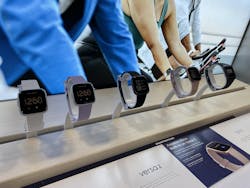Google LLC will be acquiring one of the world’s most prominent wearables companies, Fitbit, for $2.1 billion at a fully diluted equity value, the companies announced on Nov. 1.
Google will pay $7.35 per share in cash for the acquisition, Fitbit officials said in a press release announcement. The transaction is expected to close in 2020, subject to customary closing conditions, including approval by Fitbit’s stockholders and regulatory approvals.
“More than 12 years ago, we set an audacious company vision—to make everyone in the world healthier. Today, I’m incredibly proud of what we’ve achieved towards reaching that goal. We have built a trusted brand that supports more than 28 million active users around the globe who rely on our products to live a healthier, more active life,” James Park, co-founder and CEO of Fitbit, said in a prepared statement. “Google is an ideal partner to advance our mission. With Google’s resources and global platform, Fitbit will be able to accelerate innovation in the wearables category, scale faster, and make health even more accessible to everyone. I could not be more excited for what lies ahead.”
Fitbit has sold more than 100 million devices with millions of active users, and has made inroads in utilizing data to deliver unique personalized guidance and coaching to consumers.
In 2018, the San Francisco-based wearables brand announced that it would be expanding its reach into healthcare by acquiring Twine Health, a connected health platform that provides health coaching to help people manage chronic conditions. That acquisition laid the foundation for Fitbit to expand its offerings to health systems, health plans and self-insured employers.
Also last year, Fitbit and Google collaborated on a joint initiative in which the wearables company would use Google’s Cloud Healthcare API to help the company integrate further into the healthcare system by connecting user data with electronic medical records (EMR). Fitbit data, combined with EMR data, can provide patients and clinicians a more comprehensive view of the patient profile, leading to more personalized care, officials believe.
Now, the two companies are coming together again, but in a much bigger and different way. "Fitbit has been a true pioneer in the industry and has created terrific products, experiences and a vibrant community of users," Rick Osterloh, senior vice president, devices and services at Google, said in a statement. "We're looking forward to working with the incredible talent at Fitbit, and bringing together the best hardware, software and AI, to build wearables to help even more people around the world."
In a Nov. 1 blog post, Osterloh noted that Google “has made progress with partners in this space” with Wear OS, the company’s software for smartwatches, and Google Fit, a health tracking platform, but company officials saw a greater opportunity to invest even more in Wear OS as well as introduce Made by Google wearable devices into the market.
Notable, according to the announcement, “Fitbit will continue to put users in control of their data and will remain transparent about the data it collects and why. The company never sells personal information, and Fitbit health and wellness data will not be used for Google ads, officials stated.
A CNBC report on the acquisition noted that as of the end of last year, Apple owned about 50 percent of the global smartwatch market in terms of units shipped, according to Strategy Analytics, and “Fitbit has suffered headwinds as Apple’s popular smartwatch grows.”
Fitbit will continue to remain platform-agnostic across both Android and iOS, its officials noted.


